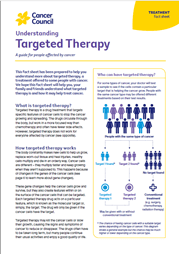- Home
- About Cancer
- Cancer treatment
- Targeted therapy
- Managing side effects
Side effects of targeted therapy
Although targeted therapy limits damage to healthy cells, it can still have side effects. These vary for each person depending on the drug you are given and how your body responds. Some people don’t have any side effects, while others have several.
Learn more about:
Possible side effects
Skin problems are a common side effect of targeted therapy.
Different drugs may cause:
- sensitivity to sunlight, skin redness, swelling and dry, flaky skin
- a rash that looks like acne or pimples on the face, scalp or upper body (acneiform rash)
- a skin reaction on the palms and soles causing tenderness and blisters (hand–foot syndrome).
Other side effects may include fever, tiredness, joint aches, nausea, headaches, itchy eyes with or without blurred vision, diarrhoea, bleeding and bruising, and high blood pressure. Less commonly, some targeted therapy drugs can affect the way the heart, thyroid, liver or lungs work, or increase the risk of getting an infection. If left untreated, some side effects can become serious (see below).
Your doctor will give you information about the side effects of the drug you are having.
Why it’s important to report side effects
While you are having targeted therapy, your treatment team will carefully monitor you with regular check-ups and blood tests. This is because some rare side effects, such as heart and lung problems, can become serious and even life-threatening if not treated.
It is important to tell your treatment team about any new or worsening side effects. Ask the doctor or nurse which side effects to watch out for or report, and who to contact after hours.
Some people worry about telling their doctor about side effects because they don’t want to stop the treatment, but side effects can be better managed when they are reported early. Your doctor may be able to prescribe medicine to prevent or reduce side effects. In some cases, you may need to take a break from treatment to prevent side effects becoming serious and causing long-term damage.
Once the side effects have gone away, you may be able to restart the targeted therapy on an adjusted dose, or try a different drug.
Managing side effects
Targeted therapy side effects can sometimes begin within days of starting treatment, but more often they occur weeks or even months later.
Most side effects are temporary, lasting from a few weeks to a few months, and will gradually improve over time or once you stop taking the drug. However, some side effects may be permanent.
Your treatment team can help you manage any side effects of targeted therapy, which often need a different approach to side effects from other cancer treatments. For example, skin problems from targeted therapy may be more severe or last longer than skin problems from chemotherapy, and you may be prescribed an antihistamine or steroid cream to help with the itching and dryness.
In some cases, your treatment team will reduce the dose of the targeted therapy drug to see if that helps ease the side effects.
When my non-Hodgkin lymphoma came back I was treated with radiation therapy and then put on rituximab for maintenance therapy. This was of great benefit – I had no worrying side effects and have felt very well in the five years since my last treatment.
Jennifer
Podcast: Immunotherapy and Targeted Therapy
Listen now
More resources
This information was reviewed by: A/Prof Brett Hughes, Senior Staff Specialist, Medical Oncology, Royal Brisbane and Women’s Hospital and The Prince Charles Hospital, and The University of Queensland, QLD; Natalie Dubs, Consumer; Hazel Everett, Clinical Nurse Consultant, Cancer Services, St John of God Subiaco Hospital, WA; Karen Hall, 13 11 20 Consultant, Cancer Council SA; Dr Hilda High, Genetic Oncologist, Sydney Cancer Genetics, NSW; Ingrid Kivikoski, Consumer; Anne McGregor, Consumer; Donna Milne, Nurse Consultant, Melanoma and Skin Service, Peter MacCallum Cancer Centre, VIC; Prof Nick Pavlakis, Board Chair, Thoracic Oncology Group of Australasia (TOGA), and Senior Staff Specialist, Department of Medical Oncology, Royal North Shore Hospital, NSW; Gay Refeld, Clinical Nurse Consultant, Breast Care, St John of God Subiaco Hospital, WA.
View the Cancer Council NSW editorial policy.
View all publications or call 13 11 20 for free printed copies.
Need to talk?
Support services
Coping with cancer?
Ask a health professional or someone who’s been there, or find a support group or forum
Need legal and financial assistance?
Pro bono legal and financial matters, no interest loans or help with small business
Cancer information
Managing side effects
Learn about the common side effects of cancer treatment and how to manage them
View our publications
Guides and fact sheets for people with cancer, their families and friends

